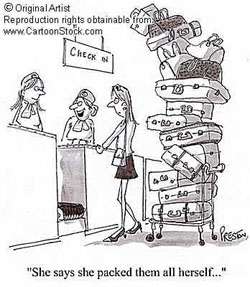When travelling by air, excess baggage charges have been around for ever but earlier today I was listening to a phone-in on the radio and some of the stories were people were being charged extra were quite shocking. Families returned from holiday in Spain were being charged hundreds of Euros and unless they paid up, they were being told they would not be allowed to fly. Therefore, I've tried to put together a few tips to help you avoid or at least reduce any charges you may incur.
 Whenever you book a flight, part of the ticketing conditions should indicate the checked in luggage allowance. Flying from the UK, this can vary by as much as 8kg per person. If you know in advance that you will exceed your allowance (for example, perhaps you are carrying golf clubs), you should contact the airline as paying charges in advance will almost always reduce your excess costs. You should also be aware that more and more airlines will also restrict the number of items you can check in. If an airline has a limit of 1 piece and 20kg per person, you need to be aware that you may well be charged if you try to check in 2 pieces at 10kg each.
Whenever you book a flight, part of the ticketing conditions should indicate the checked in luggage allowance. Flying from the UK, this can vary by as much as 8kg per person. If you know in advance that you will exceed your allowance (for example, perhaps you are carrying golf clubs), you should contact the airline as paying charges in advance will almost always reduce your excess costs. You should also be aware that more and more airlines will also restrict the number of items you can check in. If an airline has a limit of 1 piece and 20kg per person, you need to be aware that you may well be charged if you try to check in 2 pieces at 10kg each.
The first thing you need to do is to check your luggage allowance with the airline. This information is usually on their website or you can call them to find out. You should also check the hand luggage allowance as some airlines will strictly enforce the weight of this too. If it is over, you will have to repack items into your checked in baggage and this could put you over your allowance. If you are taking specialist equipment (for example, scuba diving gear), the airline may well give you a slightly larger allowance if you show your certification card at check in.
One of the best items I have purchased recently is a portable set of luggage scales. They are cheap and lightweight which means you can take them with you. I've often heard people say they weigh the suitcases by getting on the bathroom scales to weigh themselves and then re-weighing themselves holding the suitcase. That method is all very well when you are at home but how about on your return? One the tricks some airlines have used to trap people into excess charges has been to allow them to be slightly over their allowance on their outbound flight but on the return flight, strictly enforce it. There are various brands of luggage scales available but the ones I bought were the Balanzza Luggage Scales for around 15GBP. These scales have been invaluable as they allow you to easily and accurately check the weight of your suitcases and hand luggage.
Another rule you need to be aware of that some airlines enforce is the maximum weight of a single item. Often, this is set at 23kg so you also need to check the airlines rules and take this into consideration when packing. If an airline has a 15kg limit and there are two of you travelling, it is unlikely they will accept a single suitcase weighing 30kg. However, when travelling in as a family or in a group, you should be able to take advantage of the joint allowance. Usually, there is nothing wrong with spreading the allowance between all members of the travelling party and it is useful to remember that children are also usually entitled to the same luggage allowance as adults.
One of the problems is that the luggage rules by airlines are never enforced consistently. In the past, I've personally got away with luggage weights massively over my allowance and in one instance, I even took a bed frame on a plane at no extra charge. Nowadays, things are different. The airlines are suffering financially and often, they will use any excuse to get more money out of passengers. This is why it is important you know the luggage allowances and stay within them. If you don't, you have no-one else but yourself to blame if you get charged.
If you are using portable scales to weigh your luggage, it is a good idea at check in to keep an eye on the airlines scales to make sure they are set correctly. This radio phone in I was listening too seemed to highlight that some airlines in certain countries (I won't name them) were quite happy to set their scales to show a higher weight and they were putting the suitcase through before informing passengers they would have to pay excess charges. If you have weighed your luggage and the scales at check in show a big difference that will cost you money, you should reweigh your luggage to double check.
Having to pay excess baggage charges can be expensive and could ruin your holiday. It is easy enough to avoid these charges, you just need to get your information from the airline and plan ahead.